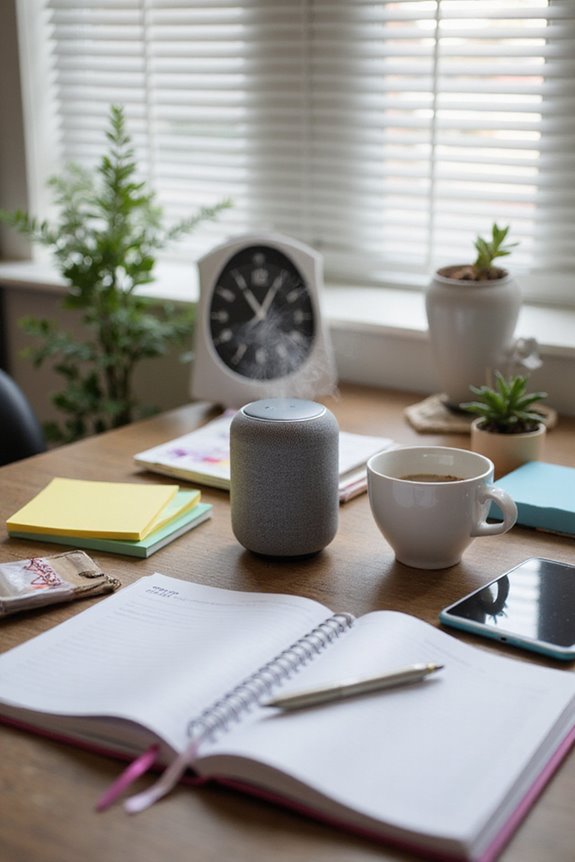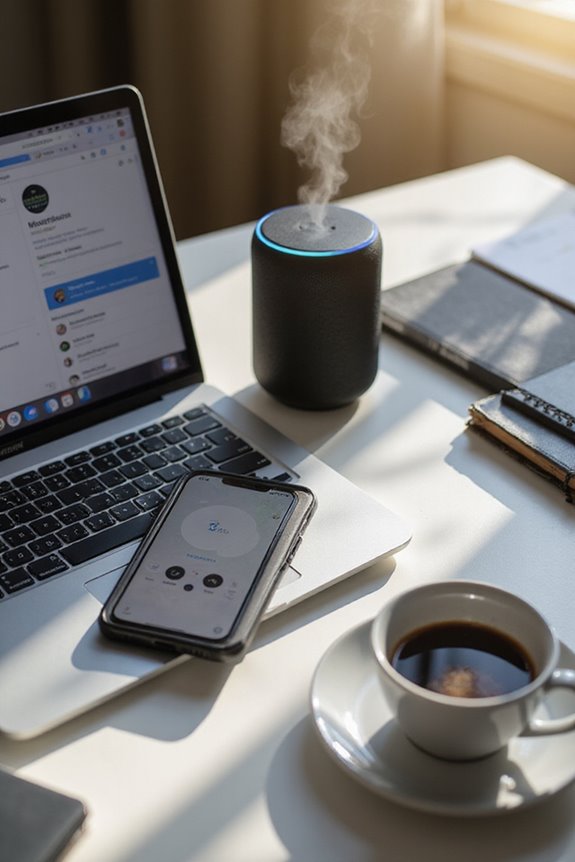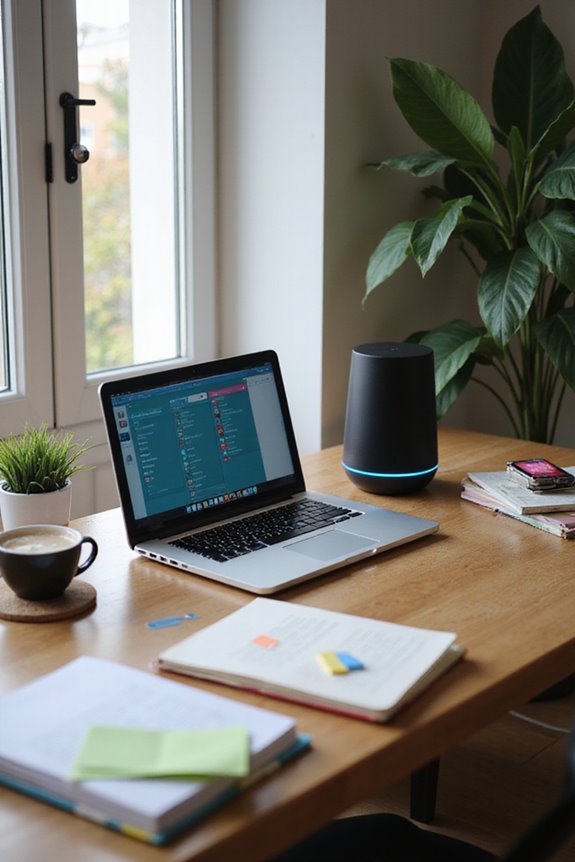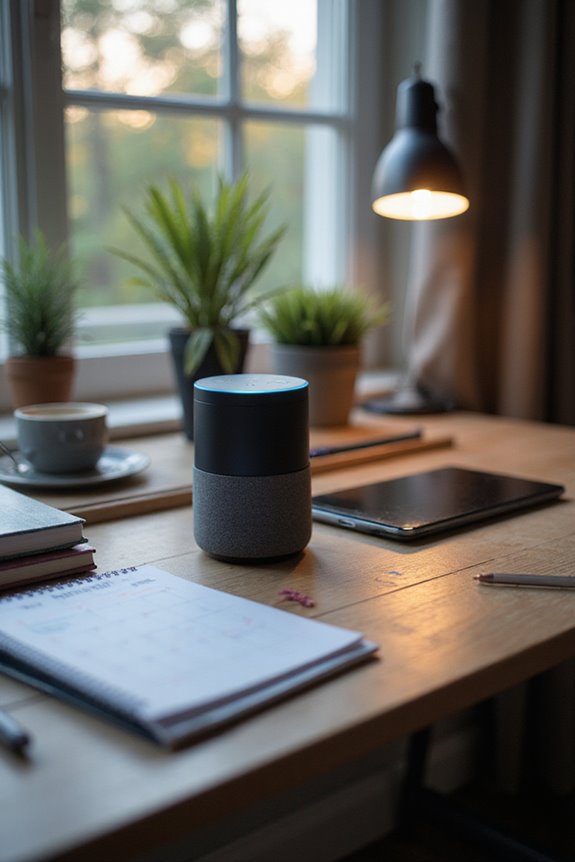Voice assistants are indeed helpful for productivity. They automate daily tasks, making it easier to set reminders and manage appointments. This hands-free functionality supports multitasking, especially in busy environments. Additionally, they improve time management by minimizing distractions and providing on-demand scheduling. Furthermore, voice assistants enhance learning opportunities for students. With the continuous growth of AI and voice technology, their integration into our lives promises even greater efficiency and support. There’s much more to explore regarding their impact.
Key Takeaways
- Voice assistants automate routine tasks, allowing users to focus on more complex responsibilities and reduce distractions.
- Hands-free functionality enhances multitasking, particularly beneficial in busy environments like healthcare or manufacturing.
- AI-driven features provide personalized reminders and scheduling, optimizing time management and task integration.
- Increased accuracy and usability in voice recognition technology boost user confidence and adoption, enhancing productivity.
- Businesses utilizing voice assistants report significant productivity growth and operational cost savings, transforming modern work dynamics.
Automation of Daily Tasks
In today’s fast-paced world, voice assistants have transformed how we manage our daily tasks. With task automation, these devices allow us to set reminders, alarms, and appointments effortlessly, reducing the need for manual input. It’s fascinating to note that over 500 million people globally rely on voice assistants, especially for smart home controls, which enhance user engagement.
Hands-free operation is a significant advantage, as 74% of users prefer interacting with voice assistants at home. In fact, 42% of adults automate daily activities like messaging and basic searches using these tools. This shift not only streamlines repetitive tasks but also aligns with growing consumer demand for seamless integration across devices, making our lives more efficient and manageable.
Enhancing Multitasking Abilities

Enhancing multitasking abilities is one of the most significant advantages of using voice assistants in both personal and professional settings. With voice recognition technology, these assistants allow for hands-free functionality, enabling me to perform tasks without manual input. This feature is particularly beneficial in environments like healthcare or manufacturing, where my hands are often busy. By automating routine tasks, I can concentrate on more complex responsibilities, which ultimately boosts my productivity. Additionally, having access to information while engaged in other activities reduces distractions and enhances my focus. Overall, the integration of voice assistants into my workflow has been a game changer, allowing me to handle multiple tasks efficiently and effectively.
Improving Time Management

Improving time management is essential for maximizing productivity, especially in today’s fast-paced environment. One effective way I manage my time allocation is through voice assistants. By setting reminders and alarms, I can prioritize tasks without the hassle of manual input. This hands-free approach minimizes distractions, allowing me to focus on more critical work.
Voice assistants also enable on-demand scheduling, which is invaluable for busy lifestyles. I can easily integrate tasks into my calendar with simple voice commands, ensuring I stay organized. With AI-driven personalization, these assistants suggest ideal times for reminders, enhancing my priority setting. Overall, leveraging voice assistant technology has streamlined my workflow, making it easier to manage my time effectively.
Streamlining Information Retrieval

While maneuvering through a busy day, I often find myself needing quick access to information, and that’s where voice assistants truly shine. These tools have revolutionized the way I perform voice searches, allowing me to retrieve information almost instantaneously. With 81% of consumers utilizing voice technology regularly, it’s clear I’m not alone in this reliance.
When I need to find local queries, voice assistants simplify the process. For instance, 58% of users like me turn to them for local business information. The efficiency of voice assistants enhances my workflow by integrating seamlessly with other tools, making information access both convenient and effective. As a result, I can focus more on my tasks while quickly obtaining the data I need.
Supporting Learning and Education

Voice assistants are making significant strides in the domain of education, providing invaluable support for both students and teachers. These tools enable personalized learning by offering instant answers, creating engaging tutor-like experiences. For students with disabilities, assistive technology guarantees educational content is accessible, enhancing inclusivity.
Moreover, voice assistants help children practice reading by giving real-time feedback and encouragement. They efficiently track learning progress and suggest areas for improvement, allowing for tailored educational experiences. With the ability to handle multiple students simultaneously, they maintain quality while scaling support. As a result, both students and teachers benefit from enhanced learning experiences, making education more effective and inclusive for everyone.
Boosting Workplace Efficiency

As businesses increasingly integrate AI assistants into their operations, they’re discovering a remarkable boost in workplace efficiency. One of the most significant benefits is increased task completion; AI helps knowledge workers accomplish their duties more efficiently, thereby enhancing overall productivity metrics. Companies incorporating AI can expect to reduce operational costs by 20-30%, allowing for better resource allocation. Additionally, studies show a 25% improvement in employee performance when using AI. AI assistants also improve customer service, enabling agents to handle 13.8% more calls per hour. By automating routine tasks, AI frees employees to focus on creative and strategic work, ultimately fostering a more productive and engaged workforce. Embracing AI integration is essential for maximizing efficiency in today’s competitive landscape. Furthermore, Bluetooth speakers can enhance communication and collaboration in remote work settings, making virtual meetings more effective.
Increasing Accessibility and Inclusivity

Integrating AI technologies like voice assistants not only enhances workplace efficiency but also plays an essential role in making daily tasks more accessible for individuals with disabilities. For instance, 1 in 3 consumers with visual impairments and 32% of people with physical disabilities utilize voice technology weekly, showcasing its significance in their lives. The accessibility features provided by voice assistants enable users to perform tasks with ease, whether it’s shopping online or managing daily routines. Over a quarter of visually impaired individuals living alone depend on these tools for independent living. Ultimately, the inclusion of voice technology underscores the importance of creating accessible solutions that enhance the quality of life for individuals with disabilities, promoting inclusivity in our society.
Future Growth and Trends in Voice Technology

The landscape of voice technology is rapidly evolving, driven by advancements in artificial intelligence and growing market demand. Voice technology innovations are set to reshape industries, greatly impacting sectors like healthcare and customer service. The global voice recognition market, valued at $12 billion in 2022, is projected to soar to $50 billion by 2029. This market expansion reflects the increasing integration of voice AI in business operations, enhancing productivity and customer interactions. As companies invest more in voice technology, we can expect smarter, real-time responses and improved accuracy in voice recognition. Additionally, voice assistants will become essential tools for automating tasks, allowing employees to concentrate on more strategic work, ultimately transforming how we operate in various fields.
User Preferences and Adoption Rates

With the rapid advancements in voice technology, understanding user preferences and adoption rates becomes increasingly important. A significant 91% of voice assistant users interact through smartphones, with 74% favoring mobile assistants at home. This trend reflects how integral voice technology has become in daily routines, driven by user demographics that show higher adoption rates among tech-savvy younger individuals and those with accessibility needs. Notably, one in three individuals with visual impairments reports weekly use. As voice assistants gain popularity, consumer trust builds, with half of users having made purchases via these platforms. This growing confidence enhances technology adoption, suggesting that as usability and accuracy improve, more users will embrace voice assistants for productivity-enhancing tasks.
Integration of AI and Its Impact on Productivity

As businesses increasingly turn to AI technology, understanding its integration and impact on productivity becomes essential. AI integration has surged, with 78% of organizations adopting it in 2024. This shift is linked to a remarkable fourfold increase in productivity growth, especially in industries like finance and software publishing. By automating repetitive tasks, AI enables employees to focus on strategic and creative work, leading to significant productivity enhancement. In addition, companies that effectively utilize AI see up to 22% savings on operational costs and three times higher revenue growth per employee. This transformation not only streamlines workflows but also fosters an environment where innovation thrives, ultimately reshaping how we approach work in the modern business landscape.
Frequently Asked Questions
Can Voice Assistants Improve My Focus While Working?
I swear, using a voice assistant feels like having a personal superhero for task management! It slashes distractions, keeps me focused, and lets me tackle work hands-free—my productivity soars as I breeze through my day!
How Secure Is the Data Shared With Voice Assistants?
I often wonder about data privacy with voice assistants. I believe user consent is essential; companies must prioritize transparency and security. It’s reassuring to see advancements aimed at protecting our information while using these devices.
Do Voice Assistants Understand Multiple Languages?
Like a multilingual friend, voice assistants can understand multiple languages. Their multilingual capabilities cater to various language preferences, allowing seamless communication. I appreciate how they adapt, switching effortlessly between languages when I need them.
Are There Any Voice Assistants Designed Specifically for Children?
Yes, there are voice assistants designed for kids! They often include child-friendly features like educational games and playful interactions, making learning fun and engaging while promoting independence and curiosity in young users.
Can Voice Assistants Help With Health and Wellness Tracking?
I’ve found voice assistants incredibly helpful for health reminders and fitness tracking. They make it easy to monitor my progress, set medication alerts, and access wellness resources, truly enhancing my overall health management.





